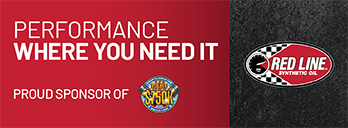JERRY ECKMAN IS READY TO TALK
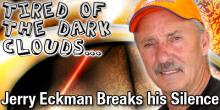 Dark clouds usually dissipate after
a brief storm. However, if you’re Jerry Eckman, those clouds are still
lingering - a painful reminder of the relentless storm he’s weathered
for more than a decade.
Dark clouds usually dissipate after
a brief storm. However, if you’re Jerry Eckman, those clouds are still
lingering - a painful reminder of the relentless storm he’s weathered
for more than a decade.
Eckman’s wearied eyes speak without
his lips moving. If they could convey a message, more than likely they
would utter, “Enough.”
He used to bite his lip, opting for silence.
Now Eckman is ready to talk. Friendships be damned, political correctness be damned. He wants his life back.
Jerry Eckman wants his life back after ten years of embarrassment
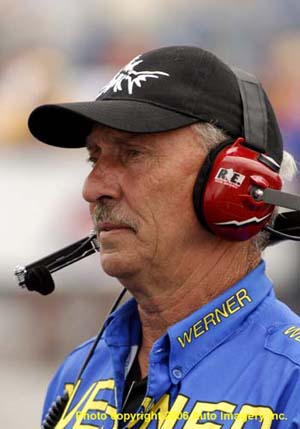 Dark
clouds usually dissipate after a brief storm. However, if you’re Jerry
Eckman, those clouds are still lingering - a painful reminder of the
relentless storm he’s weathered for more than a decade.
Dark
clouds usually dissipate after a brief storm. However, if you’re Jerry
Eckman, those clouds are still lingering - a painful reminder of the
relentless storm he’s weathered for more than a decade. Eckman’s wearied eyes speak without his lips moving. If they could convey a message, more than likely they would utter, “Enough.”
He used to bite his lip, opting for silence.
Now Eckman is ready to talk. Friendships be damned, political correctness be damned. He wants his life back.
"I was reluctant to ‘come out’ because no one could give me ten years of my life back,” Eckman said. “No one could give me back my reputation. I wasn't sure what it would solve. It feels good to talk about it. I don't know how the NHRA will feel about what I’m going to say. But it is the truth as far as I can recollect. Trust me -- it's been on my mind every day, so my recollection is just fine.
"The commentary I will make about other teams is based on my opinion and what I saw. When you see it pretty often, it is evident. They weren't caught and I was, and that's how my career ended.
"I'm sure I am rusty, but I can drive again. It's nothing a few test sessions can't fix. All I need is the opportunity."
Eckman is up-front and blunt. He wants to be known as the man who won races and represented the NHRA and Pennzoil professionally until a dark day in Columbus, Ohio, during the late 90s erased that image, severely tarnishing his reputation. When the smoke clears from this outburst, he wants the NHRA to concede that he has more than paid for what he calls a “perceived” crime. He wants to drive one last time before he’s physically unable to.
a d v e r t i s e m e n t
Click to visit our sponsor's website
Blame It On Disney
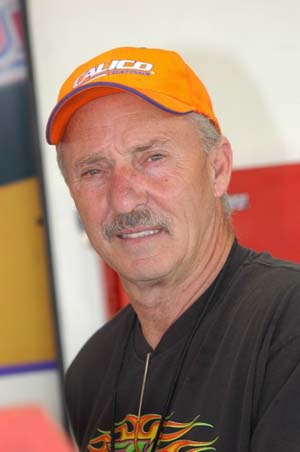 To
understand why Eckman is fighting back, we must travel back to his 14th
birthday, when a trip to Disneyland sparked his love of automobiles.
To
understand why Eckman is fighting back, we must travel back to his 14th
birthday, when a trip to Disneyland sparked his love of automobiles. “I fell in love with those motorized cars. I got back home and took the engine out of my dad’s lawnmower and began tinkering with it,” Eckman said. He got his driver’s license a year later.
"I got my license and went out to San Fernando Drag Strip the next day,” he said. “It was fun, challenging and motivating. I hung out with a great group of guys that had the competitive fever."
A tour of duty in Vietnam sidelined his racing endeavors, but once he was honorably discharged he picked up where he left off. Eckman quickly became a regular at the then-active Southern California drag racing venues.
It was during that time that Eckman met Bill Orndorff, an individual who could be described as responsible for some of the best years of his life and, by his own admission, became a catalyst for his worst.
Orndorff declined to participate in this story, although he was given numerous opportunities to do so.
Orndorff, an avid hot rodder, would later lead Eckman into the fast-paced world of Pro Stock.
"He had that same fire that I did," Eckman said. "He wasn't much of a driver. He just wanted to win. He'd be the first to admit that. "
Eckman and Orndorff pooled their resources and went Pro Stock racing in 1980.
"We didn't run the full NHRA circuit back then," Eckman said. "It came to us a few times a year."
The impressive part of it all is this independent duo qualified at every NHRA event they attended, and kept busy running some West Coast Pro Stock events on the side.
a d v e r t i s e m e n t
Click to visit our sponsor's website
The Next Level
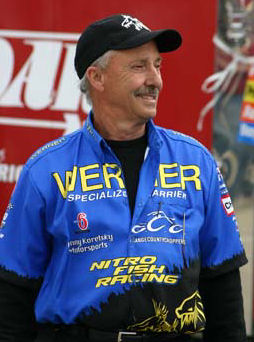 The
success of those outings provided enough confidence for Eckman to end a
17-year career with Conoco Oil and pursue drag racing as his full-time
occupation. He and Orndorff raced competitively up until 1985.
The
success of those outings provided enough confidence for Eckman to end a
17-year career with Conoco Oil and pursue drag racing as his full-time
occupation. He and Orndorff raced competitively up until 1985.
"Bill owned the majority interest because he had a business that could
support it. When I left my job, Bill put me on salary. In 1985, I guess
we were running out of money, so Bill sold the operation to a Pro Stock
racer named Stan Mizell."
Eckman says that Orndorff sold the operation during the Columbus race and went home.
"I was as frustrated as I could be. I had left my job to go racing and
now I had no job. A week later -- and I guess it was eating at him --
he called to tell me that he took the money to build a new car."
Eckman drove the new car at the Winternationals in 1986 to the fifth
qualifying position. The balance of the season went well, but it wasn't
long before they felt the familiar sting of not having a major sponsor.
Eckman tried alleviating some of the budget pressure.
"I called a friend of mine from California named Dean Tait, who was the
Pennzoil race director. I just happened to make my call at the right
time because they were looking to get into drag racing again. They came
to Englishtown in 1987 to watch the race and I won. How's that for
timing?"
Pennzoil signed on the dotted line the next week and a stipulation in
the contract pointed out that Eckman was to be the driver.
"We were a tough team to beat," Eckman said. "We won some races."
That may be an understatement. Eckman drove the Pennzoil Pontiac to
multiple victories in the Winston Invitational event and combined that
with several points-paying national event victories.
Orndorff relocated the team from Southern California to Newark, Ohio.
This was intended to make the team more centrally located while
alleviating some of the hassles and expenses of traveling.
a d v e r t i s e m e n t
Click to visit our sponsor's website
The Beginning of the End
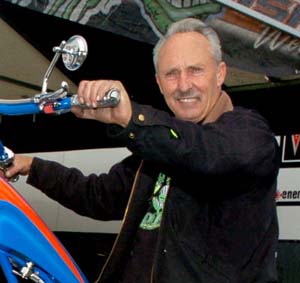 "Things
went well until our contract ended," Eckman said. "The program had run
its course. We had been with them for ten years. I know it was strictly
for business reasons, and Pennzoil had been good to us. I was tickled
with the time we had together."
"Things
went well until our contract ended," Eckman said. "The program had run
its course. We had been with them for ten years. I know it was strictly
for business reasons, and Pennzoil had been good to us. I was tickled
with the time we had together."
Eckman was trapped once again with what he felt was a sinking ship.
"I had committed myself totally to racing," Eckman said. "I had moved
out of my home state and worked exclusively in the shop with him. Bill
was frustrated that the sponsorship had ended and was committed to
getting another one.
"All activity at the shop had ceased because we didn't want to hurt any
parts and Bill didn't really want to lose any more money. We didn't
dyno any engines -- anything -- because we had limited resources."
Eckman recalled that in January of ‘97, Orndorff contacted him with
potentially good news. They needed to fly to Arizona for a sponsor
presentation, because Orndorff had an inside track with Checker,
Schuck’s and Kragen.
They threw out all the stops with their show car and an autograph session.
"On the flight home, Bill told me we had the deal. I remember asking if
we had a big enough budget and he told me that we didn't get as much as
we wanted. He told me the figure, which was pretty small. I asked him
how we were going to race like that, especially after the NHRA had
added two more events."
a d v e r t i s e m e n t
Click to visit our sponsor's website
Recipe for Disaster
Eckman said he was confident in the few spare parts they had and Orndorff's pledge to pick up more.
"It never happened," Eckman said. "We ran well early on, but I remember vividly when we broke our one good motor. We borrowed an engine from Mike Thomas. We ran really well and then the race got rained out. Mike had to go back home, so he kept his engine. That was completely understandable.
"We couldn't make it back. We were out of budget money by that point. I remember going back to the shop and struggling with enough old parts to put an engine together to go to Topeka."
Eckman said he was thrilled when they qualified 13th.
"We went to Englishtown and didn't make the cut," Eckman said. "Bill was fit to be tied. The next race was at our home track in Columbus."
Eckman contends that he reasoned with Orndorff to sit out the rest of the season. That suggestion started a ball of destruction rolling that couldn't be stopped.
a d v e r t i s e m e n t
Click to visit our sponsor's website
An Incriminating Situation
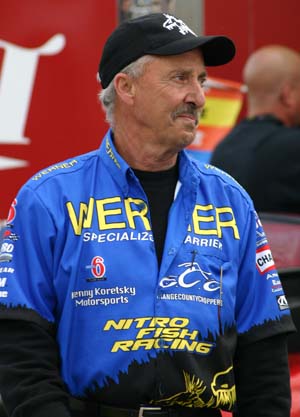 "I
was at the shop when Bill brought a gentleman into the office and they
had a meeting," Eckman said. "When they came out, Bill came over to me
and told me that the guy was from a nitrous oxide company.
"I
was at the shop when Bill brought a gentleman into the office and they
had a meeting," Eckman said. "When they came out, Bill came over to me
and told me that the guy was from a nitrous oxide company. "I immediately asked him, 'Why would you introduce me to someone like that or bring them to our shop?' He responded that he wanted to do well at his home track."
Eckman says that moment put a strain on their two-decades-long relationship.
"I immediately told Bill that it would tarnish anything I'd ever accomplished (if we used nitrous oxide). I told him that I couldn't do that. He told me that he wouldn't do it. I'm not even going to say that I didn't know that he wanted to do it. I knew he wanted to do it.
“I want to emphasize that we never ran (the nitrous system). Ever."
The arguments about using nitrous oxide increased between the longtime friends.
"Bill said he wanted to test it, and some things were tested on the dyno. I was pretty irritated. We had some blocks and some cylinder heads, so he sent me over to Mike Thomas's shop. I went over there and they helped me with a legal engine.
"We had a decent engine on the dyno and it was ready to go out to Columbus. It was all we had. I remember rushing home, taking a shower and heading to the track."
Eckman says he found himself trapped in an unethical situation like a baseball player with a corked bat in the dugout who never stepped into the batter’s box.
"I got there and the car was out and the crew was attending to it. Bill was there and the car was on the jack-stands. He was wondering where I had been,” Eckman said.
"The oil pump belt was off and that was normal if you prime the engine. I asked if they had the car ready and I was told they wanted to prime the engine. Bill told me he wanted me to do it and that was strange because I don't normally do it."
Eckman wasn’t so naïve that he doesn’t admit taking notice of the red flags. He had the opportunity to walk away from it all – but he says he felt he would have lost everything he had sacrificed for much of his life if he took a stance and walked away. There weren’t many jobs for 50-something Pro Stock drivers with the wave of young talent entering the class.
Eckman couldn’t deny that things just weren’t right. The oil tank was filled clear to the top.
"That just wasn't normal. I started to pump it."
As it pumped down, Eckman said that Orndorff walked over to him and whispered in a hushed-tone, "I've got that deal in there. It's not hooked up. I just have it in there."
Eckman made his decision and fired the engine.
"I'm not saying it wasn't hooked up. I'm not saying it would have been. It was just the bottle and it exploded."
Eckman says at that moment his career ended.
"It's a tough way to go out," Eckman said. "The car never left the pit area."
Members of the NHRA's tech department came over to the pit area, as did another crew chief in whose pit area the bottle had landed.
a d v e r t i s e m e n t
Click to visit our sponsor's website
The Aftermath
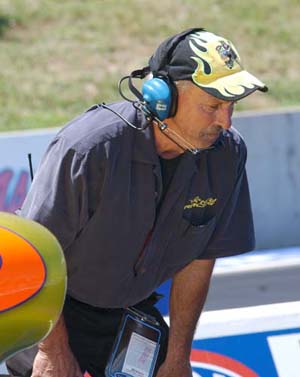 "I
walked into the trailer and told Bill, 'They'll always remember me but
not you,’ Eckman said. “That has come true. You can mention Bill's name
and it sounds unfamiliar to (many people).
"I
walked into the trailer and told Bill, 'They'll always remember me but
not you,’ Eckman said. “That has come true. You can mention Bill's name
and it sounds unfamiliar to (many people)."It just came at a bad time because the NHRA was under a lot of pressure (due to another situation involving another Pro Stock team). I was the best thing that ever came along for the NHRA. I became their scapegoat."
The end result was harsh, probably the harshest fine ever levied in the history of the sport. Eckman and Orndorff received two-year suspensions and a $50,000 fine. That is where the lines become a bit grey for Eckman.
"Bill sold the business, and my teammates and him went over to a new team with Dick Sherman," Eckman said. "They never missed a step."
Eckman wasn't so lucky. He had the fine and penalty to deal with. Orndorff did as well, but his wasn't as stringent, in Eckman’s view.
"Bill wasn't a driver, so it didn't affect him," Eckman said. "He could buy a ticket and go in the track. That team actually won two races that year.
"I was sent home in disgrace. I only got one phone call and that was from Bill to see if I wanted to go watch them test. I didn't want to go out there. What was I going to do? Hold the balloon?
"I waited for two years and I had always considered myself a pretty good driver,” he said. “I knew how to win and I think those who raced against me would tell you the same."
Eckman received an offer from Dave Beli to drive for his new team.
“Beli offered to help with the $25,000 fine and I had come up with about $13,000 of it."
Eckman met with the NHRA and a deal was worked out under which he’d pay the $13,000 in the first year and $1,000 per month during the second season. The NHRA agreed to the proposal.
Eckman's license was reinstated and he ran three races before Beli sold the team in the offseason.
"I did come back to Graham (Light, senior vp of NHRA) a few years ago and offered another $6,000 for him to reinstate my license," Eckman said. "That would have been $19,000 and probably more of a fine than anyone had ever paid. He brought it before the committee and they declined it.
"At this point in my life, I would have liked to have driven more. Am I past my prime? Maybe. Let's not forget that I had my best year (when I was) 52. It was all taken away," he said.
a d v e r t i s e m e n t
| {flashembed}swf=/images/banners/flashBanner/reherad2.swf|w=468|h=60{/flashembed} |
Click to visit our sponsor's website
Life Today -- Branded A Cheater
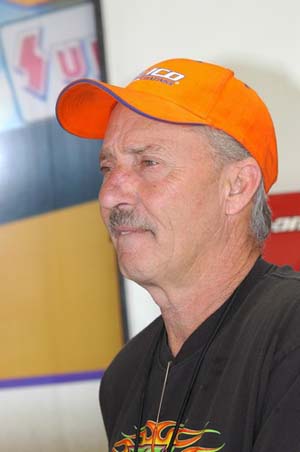 Eckman
still works in the industry and makes 23 stops a year as a wrench on
Kenny Koretsky’s team. He said he’s content with his role for now but
more than anything he wants the racing community to hear his story. He
said he’s tired of being the guy that ignorant individuals refer to as
“the Pro Stock guy sponsored by (a nitrous company).”
Eckman
still works in the industry and makes 23 stops a year as a wrench on
Kenny Koretsky’s team. He said he’s content with his role for now but
more than anything he wants the racing community to hear his story. He
said he’s tired of being the guy that ignorant individuals refer to as
“the Pro Stock guy sponsored by (a nitrous company).”Said Eckman, "It's horrible. I've brought it up with Bill and he contends that it’s old news. It's old news to him because he's not out here. I hear it every day. People still come up and ask me how I get out here when I was banned for life. It has been a tough pill for me to swallow.
"It's a punishment greater than anyone could ever imagine,” he said. “I'd have to die and come back as someone else to drive again. It's heart-breaking for me. Can you imagine someone taking your livelihood away and you can never do it again? That's a tough pill to swallow."
Losing purpose could lead one to end his life. Eckman stood on that brink.
"Sure I did. I couldn't have been any lower than I was. I thought about a lot of things, but I can't cry over it any more. It is what it is,” he said. “That's the way NHRA perceives it. I never left the pit area with the car. I respect the NHRA's ruling but nothing was ever hooked up.
"I'm not even sure we were teched. I know I wasn't there (at National Trail Raceway) to sign the tech card. I had just gotten there."
"I've seen some racers who raced in IHRA and NHRA come in with 800-inch motors and get teched. That didn't mean they were going to run it in competition. We had an engine coming from the shop, right off the dyno, that we were going to put in,” Eckman said.
Ten years later Eckman is still dogged by the stigma. The issue came up recently at a sports bar near Pomona filled with drag racers.
“The bar was having a game of sports trivia,” he said. “There were thirty questions and it was ten for football, ten for baseball and ten for auto racing. I was just listening and I was going to play but I got sidetracked.”
Question seven in the auto racing category asked, “What illegal substance is used in auto racing to enhance power?”
“All of the racers in the bar looked at me, yelled and pointed me out,” Eckman said. “How’s that for a tough pill to swallow? I wondered what the chances of that scenario transpiring were. Can you imagine that? I had to walk out of the place. It just goes to show how this is never forgotten. Any time the subject is brought up, I’m the guy.”
a d v e r t i s e m e n t
| {flashembed}swf=/images/banners/flashBanner/ramad5.swf|w=468|h=60{/flashembed} |
Click to visit our sponsor's website
Eckman Holds Court
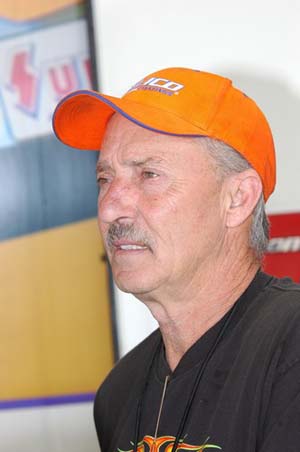 "I
can't say honestly whether or not Bill would have run (the nitrous
system). But, it wouldn't have worked. You can't put a pressurized
bottle in an oil tank. It would have exploded (as the oil heated up)
and it did. It was a foolish thing to do,” Eckman said.
"I
can't say honestly whether or not Bill would have run (the nitrous
system). But, it wouldn't have worked. You can't put a pressurized
bottle in an oil tank. It would have exploded (as the oil heated up)
and it did. It was a foolish thing to do,” Eckman said. "Bill has told me over the years that there hasn't been a day go by that he hasn't regretted it. I believe him, but nonetheless I am the one who has paid the ultimate price,” he said.
"I have worked around carburetors and gasoline racing all of my life. I've never seen a carburetor fire blow out the end of a hood scoop by six feet (as happened to one car during qualifying for the U.S. Nationals some years ago).
"I do know that one racer made it public how it was done,” Eckman said. “He came and qualified at a few races. He showed everyone how he did it up through the motor plate - through the frame and into the hood scoop tubes.”
Legally there was a loophole that made the largely taboo act of nitrous in Pro Stock legal. According to one racer in that era, the illegality of nitrous oxide was never officially stated as such in the rulebook during the mid-1990s.
A number of racers both present and past, said the practice behind the scenes was common. One driver exploded an intake in the pits and another quickly earned the nickname “frosty” after a nitrous malfunction frosted up the rear window of his car. These incidents also slipped past the tech department.
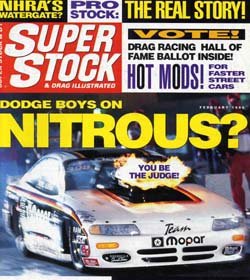 A protest by the legendary Pro Stock figure Bob Glidden regarding the
issue led the NHRA to issue a memo in Memphis following the final
session of qualifying. This note reminded racers that nitrous oxide was
not permitted in the class and the use thereof would result in
penalties.
A protest by the legendary Pro Stock figure Bob Glidden regarding the
issue led the NHRA to issue a memo in Memphis following the final
session of qualifying. This note reminded racers that nitrous oxide was
not permitted in the class and the use thereof would result in
penalties.One of the suspected teams immediately fell off their torrid qualifying pace and fouled out of competition on Sunday.
Eckman said, “The very next race (that questionable) team qualified strong and ran poorly in the first round. Right after that race (there was another incident away from the track).
"When it looks like it, tastes like it and smells like it - it usually is it,” he said. “No one was ever caught red-handed but I think (that team) was. I think no one ever investigated it. I think the proof was there all along - it never got investigated. I guess if you get away with it you're not guilty. Everyone out there racing knew what was going on.
"It doesn't change anything that happened to me,” Eckman said. “It just came along at a convenient time when the NHRA was under pressure for a scapegoat.”
a d v e r t i s e m e n t
| {flashembed}swf=/images/banners/flashBanner/asherbanner.swf|w=468|h=60{/flashembed} |
Click to visit our sponsor's website
The Benefit of the Doubt
Eckman said he knows this article will
more than likely drive an immovable wedge between himself and Orndorff,
but at this point he chooses self-preservation.
Eckman said he would love nothing more than to extend the benefit of
the doubt to Orndorff when it comes to whether or not the illegal
nitrous system would have been utilized.
"Whether he would have implemented it, it wouldn't have worked, and I
think we all saw the end result of it all. It exploded and it wasn't
even hooked up. It was just a foolish thing to do."
Eckman says the remorse is genuine.
"Bill tells me every time that we speak that there isn't a day that goes by that he doesn’t regret what happened.
Eckman paused for a moment and wiped his eye and said, “Me, too.”
| {loadposition feedback} |

